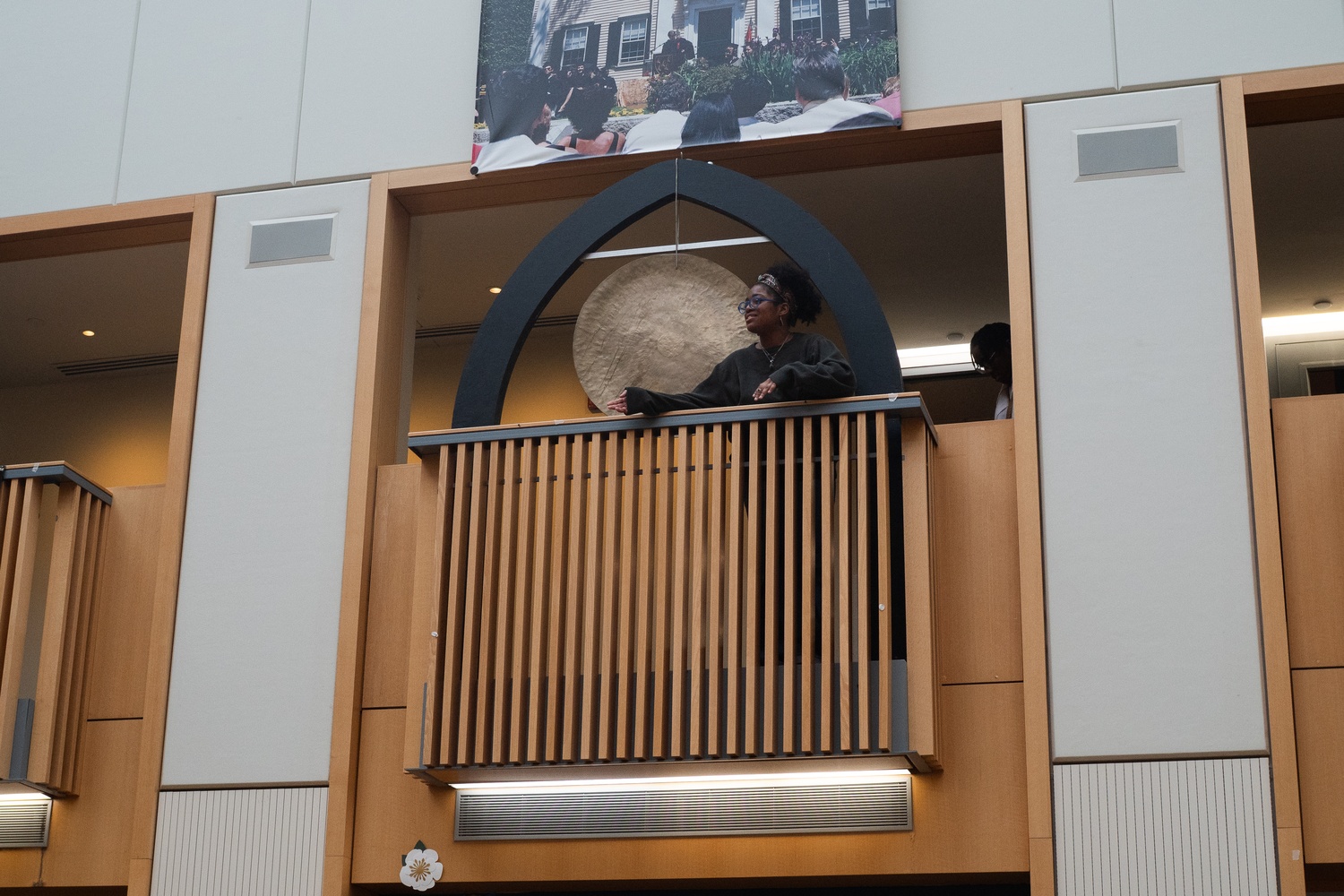
News
Harvard Medical School Cancels Student Groups’ Pro-Palestine Vigil

News
Former FTC Chair Lina Khan Urges Democrats to Rethink Federal Agency Function at IOP Forum

News
Cyanobacteria Advisory Expected To Lift Before Head of the Charles Regatta

News
After QuOffice’s Closure, Its Staff Are No Longer Confidential Resources for Students Reporting Sexual Misconduct

News
Harvard Still On Track To Reach Fossil Fuel-Neutral Status by 2026, Sustainability Report Finds
AFRO Holds Discussion in Adams Dining Hall, Despite Warning to Organizer

Roughly 20 Harvard members of the African and African American Resistance Organization gathered in the Adams dining hall on Saturday to discuss campus policies and censorship — even after administrators warned a leader not to use House spaces for meetings.
The meeting was originally going to take place in a conference room 217 in the Adams Inn. But it was moved to the dining hall after Sa’maia J. Evans ’27 received a dean’s warning for reserving the room because AFRO is an unrecognized student organization.
In a Friday evening email to Evans, Adams House Resident Dean Charles “Chip” Lockwood wrote that unrecognized organizations reserving campus spaces “is in violation of Harvard College policy.”
Lockwood cited the Harvard College Student Handbook, which states that “unrecognized organizations are not permitted to conduct any activity at Harvard even though their activities involve Harvard undergraduates.”
Lockwood did not respond to a request for comment.
He also wrote that any “attempt to go forward with tomorrow’s event in Adams House will result in a referral to the Administrative Board.”
Before Saturday’s meeting began, Evans rang the gong that sits on a second-floor balcony overlooking the dining hall and gave a short speech about the warning she received to everyone eating lunch below.
“It’s not about being unrecognized, it’s about student oppression,” said Evans, from the second-floor balcony. “They can tell us we can’t meet in 217, but what can we do?”
“Meet in the dining hall,” responded fellow AFRO members from the crowd below.
Organizers pulled dining hall tables together, forming a discussion group in back of the dining hall as residents continued eating their lunches.
Evans then opened the meeting by critiquing Harvard’s ban on unrecognized groups, calling the policy “crazy.”
“How many orgs are unrecognized? Like 10 million,” Evans said. “What’s the difference between a bunch of students sitting and talking about an issue that relates to us as students and an unrecognized org?”
Evans accused Lockwood of “saying that I can’t book 217 because I like to meet with my Black friends and talk about political issues.”
“It’s not about being unrecognized, it’s about student repression,” she added.
The group talked for two hours about the state of student activism under the Trump administration’s threats, encouraging attendees to protest together in the face of increasing pressure from the federal government.
William Wahpepah, a tutor in Adams House, attended the event alongside undergraduates. He said he was under the “false impression” that the House was a space for free expression, and that he attended Saturday’s discussion because he thought it was his duty as a tutor to ensure students had spaces to talk freely about issues that matter to them.
“I want you all to know, tap on us,” he said.
Prince A. Williams ’25 called on attendees to form a “united front” against the Trump administration’s deportation efforts and attempts to pull universities’ funding.
“It’s the common enemy who’s going after immigrants. It’s the common enemy who’s funding the genocide, it’s the common enemy who’s pulling everything from higher education.” Williams said. “All of this is being perpetrated by the same force.”
In the past, multiple other unrecognized organizations have used Harvard spaces to conduct meetings, including the Harvard Vote Socialist 2024 campaign and Harvard for Harris.
A College spokesperson declined to comment on the event, citing a policy against commenting on student disciplinary matters.
For some meeting attendees, the email from Lockwood only strengthened their commitment to continue organizing.
“This isn’t the time to cower — or anything like that,” said Kojo Acheampong ’26, an AFRO organizer. “It’s actually to double down on what our principles are, on what we believe.”
After the event, AFRO posted a video on their Instagram page about the email Lockwood had sent to Evans.
“Look at what we saw today when we had this meeting. Where was Chip? Where was University administration? Where was the Ad Board? Nowhere,” Evans said in the video.
“Guess what? The movement is working, and the movement is working, and the movement is steadfast,” she added.
—Staff writer Samuel A. Church can be reached at samuel.church@thecrimson.com. Follow him on X @samuelachurch.
—Staff writer Cam N. Srivastava can be reached at cam.srivastava@thecrimson.com. Follow him on X @camsrivastava.
Want to keep up with breaking news? Subscribe to our email newsletter.
